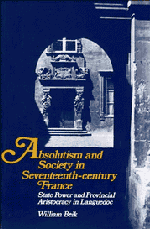 Absolutism and Society in Seventeenth-Century France
Absolutism and Society in Seventeenth-Century France Published online by Cambridge University Press: 05 July 2011
The sovereign courts were curious institutions whose role is difficult for the modern observer to grasp. As judicial companies with jurisdiction over certain categories of litigation their function is readily comprehensible, but as centers of moral authority, social domination, and political command their importance seems mysterious. Both the Parlement in Toulouse and the Cour des Comptes in Montpellier were concentrations of individuals who combined personal authority, manifested through client ties and the control of seigneuries or investments, with corporate power expressed through their companies' vast influence. In addition to the jurisdictional authority which each exerted over the whole province, the two had more intense spheres of influence around their geographical centers in Haut-Languedoc and Bas-Languedoc respectively. Both were central actors in the drama of provincial affairs.
THE PARLEMENT OF TOULOUSE
The Parlement was the most prestigious center of influence in the province by virtue of its vast jurisdiction, its continuity of tradition, and the aggregate social prestige of its members. These pompous dignitaries presided over a complex of buildings and towers at the southernmost extremity of Toulouse on a site formerly occupied by the château Narbonnais of the medieval counts. They thus occupied the traditional seat of comtal, then royal, authority in a spot as far removed from the Capitole and its rival capitouls as the narrow confines of the city would allow.
To save this book to your Kindle, first ensure [email protected] is added to your Approved Personal Document E-mail List under your Personal Document Settings on the Manage Your Content and Devices page of your Amazon account. Then enter the ‘name’ part of your Kindle email address below. Find out more about saving to your Kindle.
Note you can select to save to either the @free.kindle.com or @kindle.com variations. ‘@free.kindle.com’ emails are free but can only be saved to your device when it is connected to wi-fi. ‘@kindle.com’ emails can be delivered even when you are not connected to wi-fi, but note that service fees apply.
Find out more about the Kindle Personal Document Service.
To save content items to your account, please confirm that you agree to abide by our usage policies. If this is the first time you use this feature, you will be asked to authorise Cambridge Core to connect with your account. Find out more about saving content to Dropbox.
To save content items to your account, please confirm that you agree to abide by our usage policies. If this is the first time you use this feature, you will be asked to authorise Cambridge Core to connect with your account. Find out more about saving content to Google Drive.